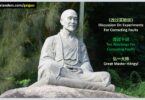返照回光,复本心性
[263] Return [To] Reflect [With] Returning Light, [To] Restore Original Mind-Nature
夫心者,即寂即照,不生不灭,廓彻灵通,圆融活泼,而为世出世间一切诸法之本。
That mind, [is] both still and illuminating, not arising [and] not ceasing, expansive [and] pervasive, efficacious [and] penetrative, perfectly harmonious [and] lively, then as [the] root of all worldly [and] world-transcending dharmas.
虽在昏迷倒惑具缚凡夫之地,直下与三世诸佛,敌体相同,了无有异。故曰「心佛众生,三无差别。」
Although on [the] ground of ignorant [and] inverted confusions [of] completely bound ordinary beings, directly with [the] three periods’ all Buddhas, [they] match [in] essence, [and are the] same as one another, completely without having differences. Thus saying, ‘[Of the] mind, Buddhas [and] sentient beings, [these] three [are] without differences.’
[Note 1: Three periods (三世): (i) past period (过去世), (ii) present period (现在世), (iii) future period (未来世).]
但以诸佛究竟证得,故其功德力用,彻底全彰。凡夫全体迷背,反承此功德力用之力,于六尘境,起贪瞋痴,造杀盗淫。
Only with all Buddhas [having] ultimate realisation attained, thus [are] their meritorious virtues’ powers [and] functions, thoroughly [and] entirely manifested. Ordinary beings, entirely [with] confusions [and] contradictions, instead [of] receiving this power of meritorious virtues’ power [and] functions, in [the] six dusts’ realms, give rise [to] greed, anger [and] delusion, [to] create killing, stealing [and] sexual [misconduct].
[Note 2: Six dusts (六尘): (i) form dust (色尘), (ii) sound dust (声尘), (iii) smell dust (香尘), (iv) taste dust (味尘), (v) touch dust (触尘), (vi) thought dust (法尘).]
因惑造业,因业感苦。惑业苦三,互相引发。因因果果,相续不断。经尘点劫,长受轮回。纵欲出离,末由也已。
Because [of] confusions creating [evil] karmas, because [of evil] karmas connecting [to] suffering. Confusions, [evil] karmas [and] suffering, [these] three, lead to one another. Cause [after] cause, effect [after] effect, [with] continuity unceasing. Passing dust motes [of] kalpas, long receiving rebirth. Even if desiring [to] depart, also not [with the] cause [to do so].
喻如暗室触宝,不但不得受用,反致被彼损伤。迷心逐境,背觉合尘,亦复如是。
Analogous to [in a] dark house touching [a] treasure, not only not attaining [its] benefits, instead leading [to being] by that harmed. [With] confused minds chasing realms, [with] backs [to] awakening, joining [the] dusts, likewise thus.
如来悯之,为说妙法,令其返妄归真,复本心性。
[The] Thus Come [One], sympathising [with] them, for [them] spoke [the] wonderful Dharma, [to] lead them [to] return [from the] false [to] return [to the] true, [and to] restore [their] original mind-nature.
初则即妄穷真,次则全妄即真。如风息波澄,日暖冰泮,即波冰以成水,波冰与水,原非二物。
First then, immediately [with the] false ending [is the] true. Next then, [the] entirely false [is] immediately [the] true. Like wind ceasing [with] waves settling, [the] sun warm [with] ice melting, then [are] waves [and] ice, with [them] becoming water. Waves [and] ice, with water, originally [are] not two objects.
当其未澄未泮之前,校彼既澄既泮之后,体性了无二致,相用实大悬殊。
When before those [are] yet [to be] settled [and] yet [to be] melted, compared [with] those after, already settled [and] already melted, [their] essential nature [are] completely without two causes, [although their] forms [and] functions truly [are] greatly far apart.
所谓修德有功,性德方显。若唯仗性德,不事修德,则尽未来际,永作徒具佛性、无所恃怙之众生矣。
[When] so-called cultivated virtues have merits, nature’s virtues then manifest. If only relying [on] nature’s virtues, not practising [for] cultivated virtues, then [to the] utmost [of the] future’s limit, [this is] forever regarded as only possessing Buddha-nature, [as] sentient beings without that [to] rely on.
故《般若心经》云:「观自在菩萨,行深般若波罗蜜多时,照见五蕴皆空,度一切苦厄。」夫五蕴者,全体即是真如妙心,但由一向迷背,遂成幻妄之相。
Thus [does the] Prajñā Heart Sūtra say, ‘[The] Bodhisattva [Who] Contemplates [At] Ease, when practising [the] profound Prajñā Pāramitā [i.e. perfection of wisdom] , contemplated [upon and] realised [the] five aggregates [to] all [be of] emptiness, [and] crossed over all suffering [and] difficulties.’ Those five aggregates, are entirely the same as True Thusness’ wonderful mind, only due [to] all along [being] confused [and] contradictory, thereupon becoming forms of illusions [that are] false.
[Note 3: Five aggregates (五蕴): (i) form (色), (ii) feeling (受), (iii) perception (想), (iv) volition (行), (v) consciousness (识). With constant changing (无常) without substantiality (无我), these are thus ‘empty’ (空) of permanence (常) and self (我).]

妄相既成,一真即昧。一真既昧,诸苦俱集。如风动则全水成波,天寒则即柔成刚。
[With] false forms already formed, [the] one true [is] then concealed. [With the] one true since concealed, all sufferings together accumulate. Like [the] wind moving, then [with the] entire water becoming waves, [with the] weather cold, then [with the] soft becoming hard.
照以甚深般若,则了知迷真成妄,全妄即真。如风息日暖,复还水之本体耳。故知一切诸法,皆由妄情所现。
Illuminating with extremely profound Prajñā, then understanding clearly [that by] confusing [the] true, [it] becomes [the] false, [the] entirely false [is] then [the] true. Like [with the] wind ceasing [and the] sun warming, again returning [to the] original essence of water only. Thus know [that] all dharmas, [are] all due [to] false passions that [they] appear.
若离妄情,则当体全空。以故四大咸失本性,六根悉可互用。所以菩萨不起灭定,现诸威仪。
If departing [from] false passions, then [will] those essence [be] entirely empty. Therefore, [the] four great [elements will] all lose [their] original nature, [and the] six roots all can function [as] one another. Therefore, Bodhisattvas [do] not give rise [to] cessation’s concentration, [and] appear [with] all majestic conduct.
[Note 4: Four great elements (四大): (i) earth great element (地大) of solidity, (ii) water great element (水大) of fluidity, (iii) fire great element (火大) of (heat) energy, (iv) wind great element (风大) of movement.]
[Note 5: Six roots (六根): (i) eye root (眼根), (ii) ear root (耳根), (iii) nose root (鼻根), (iv) tongue root (舌根), (v) body root (身根), (vi) mind root (意根).]
[Note 6: To give rise to cessation’s concentration (灭定) is to enter Voice-hearers’ (声闻) meditative state that ceases feeling (受) and perception (想), thus not being able to respond to sentient beings in need.]
眼根作耳根佛事,耳根作眼根佛事。入地如水,履水如地。水火不能焦濡,虚空随意行住。境无自性,悉随心转。
[With their] eye root doing [the] ear root’s Buddha practices, ear root doing [the] eye root’s Buddha practices. Entering earth like water, treading [on] water like earth. [With] water [and] fire not able [to] scorch [or] wet, [in] empty space as wished walking [and] standing. [As] realms [are] without self-nature, all accord [with their] minds [to be] transformed.
[Note 7: These are expressions of great ease (自在) in utilising supernormal feet’s supernormal power (神足通) of levitation, flight, teleportation and manifestation. This is possible with realisation of the empty (i.e. not fixed) nature of the six roots (六根) and the four great elements (四大).]
故《楞严》云:「若有一人发真归元,十方虚空,悉皆消殒。」乃「照见五蕴皆空」之实效也。
Thus, [the] Śūraṅgama [Sūtra]《楞严经》says, ‘If [there] is one person giving rise [to the] true [for] returning [to the] source, [the] ten directions’ empty space, all [will] disappear [and] fall [away].’ Thus [is the] true effect of ‘contemplated upon [and] realised [the] five aggregates [to] all [be of] emptiness.’
「归」者「归投」、「归还」,即「返照回光,复本心性」之义。
That ‘returning’ [is to] ‘seek shelter [and] obey’, [to] ‘go back’ [i.e. revert]. [This] then [is the] meaning of ‘return [to] reflect [with] returning light, [to] restore original mind-nature’.
然欲「返照回光,复本心性」,非先「归心三宝,依教奉行」不可。
However, desiring ‘[to] return [to] reflect [with] returning light, [to] restore original mind-nature’, [if] not first ‘returning [the] mind [to the] Triple Gem, [to] rely on [the] teachings [to] practise’, [this] cannot [be done].
既能「归心三宝,依教奉行」,自可「复本心源,彻证佛性」。
Already able [to] ‘return [the] mind [to the] Triple Gem, [to] rely [on the] teachings [to] practise’, [this] naturally can ‘restore [the] original mind’s source, [to] completely realise Buddha-nature’.
既得「复本心源,彻证佛性」,方知自心至宝,在迷不减,在悟不增。
Already attaining ‘restoring [of the] original mind’s source, [to] completely realise Buddha-nature’, then knowing one’s mind [is the] most valuable treasure, in confusions not decreased, [and] in awakening not increased.
但以顺法性故,则得受用,违法性故,反受损伤,而利害天渊迥别耳。
Only with complying [to] Dharma-nature thus, then attaining [its] benefits. [With] violating [of] Dharma-nature thus, instead receiving harm. Then [are] benefits [and] harms [like the] sky [and the] abyss, [with] differences far apart.
净土宗十三祖印光大师
Pure Land Tradition’s 13th Patriarch Great Master Yìnguāng
《印光法师文钞》(正编):归心堂跋;
Dharma Master Yìnguāng’s Collected Writings (First Compilation): Hall [Of] Return [To] Mind’s Afterword;
印光大师文钞菁华录(第两百六十三则):八、释普通疑惑:论心性(第十二则)
Record [Of] Great Master Yìnguāng’s Collected Writings’ Essence (263rd Short Section): 8th Chapter: Explanations [On] Common Doubts [And] Confusions: Discussion On Mind-Nature (12th Short Section)
[Ref: #263 / 8.12]
Namo Amituofo : Translation and notes by Shen Shi’an
下一部分
Next Part:
致极修德,彻证性德
[264] Attain Utmost Cultivated Virtues And Complete Realisation Of Nature’s Virtues
https://purelanders.com/2025/06/13/264-attain-utmost-cultivations-virtues-and-complete-realisation-of-natures-virtues
上一部分
Previous Part:
《心经》之心法
[262] The Heart Dharma Of The Heart Sūtra
https://purelanders.com/2023/07/13/262-the-heart-dharma-of-the-heart-sutra
完整典籍
Complete Text:
《印光大师文钞菁华录》
Record Of Great Master Yìnguāng’s Collected Writings’ Essence
https://purelanders.com/jinghualu





